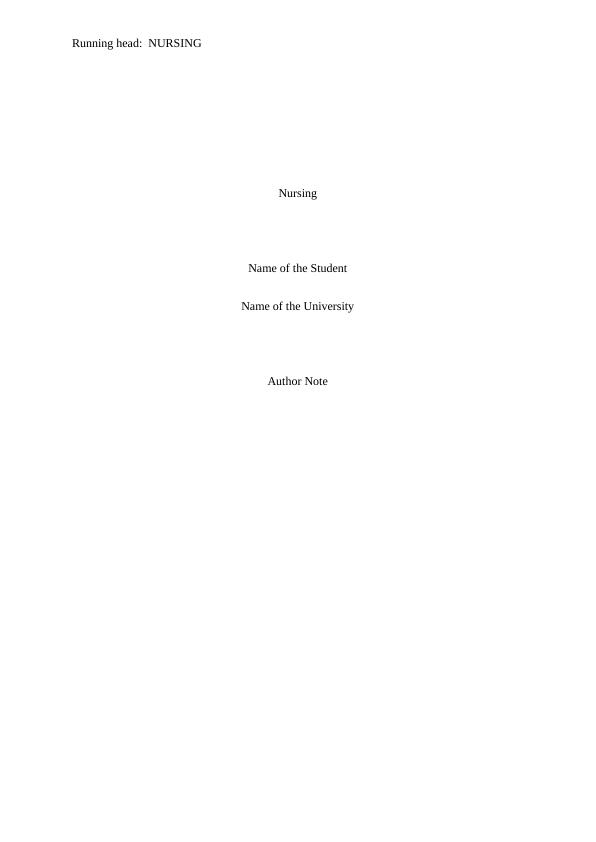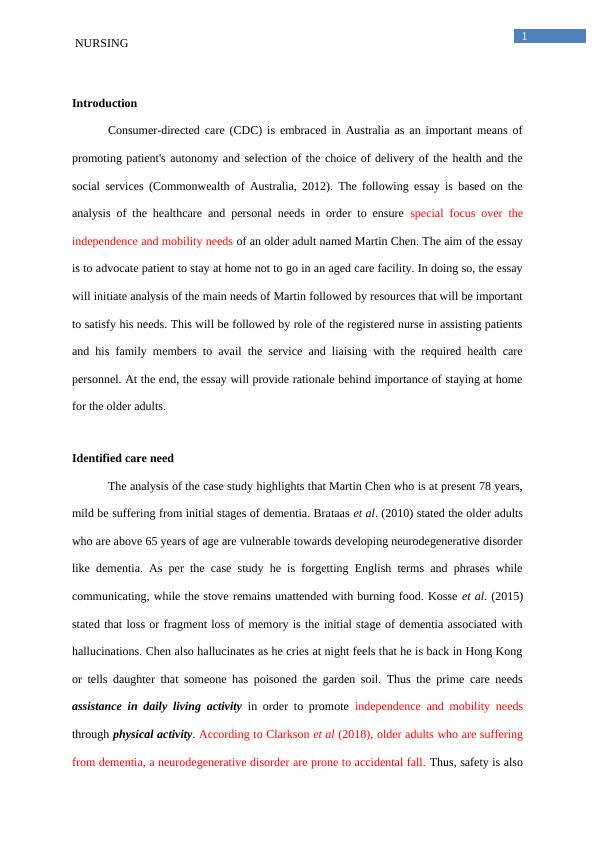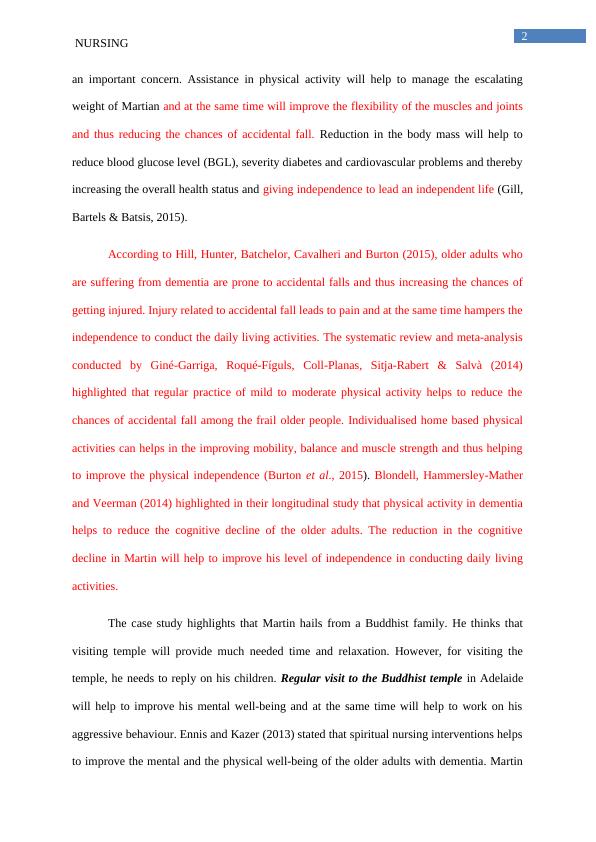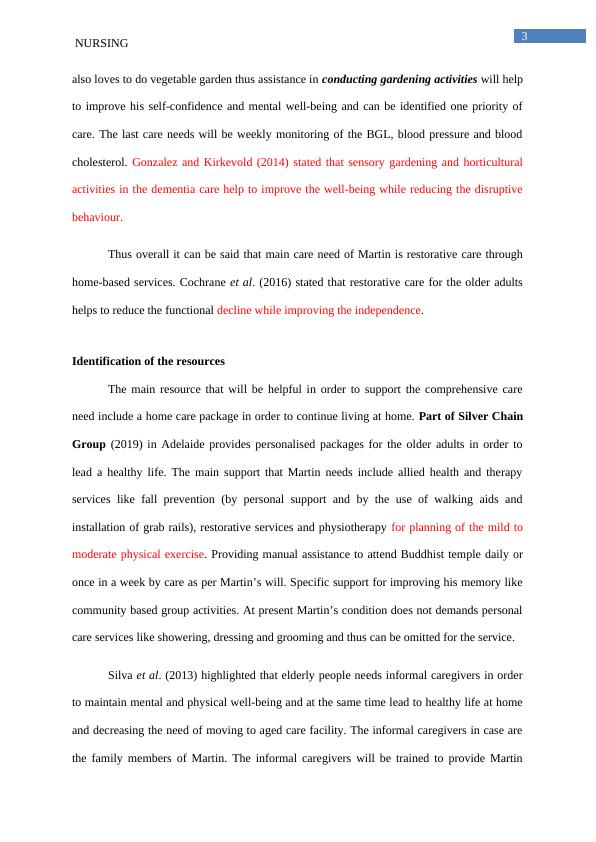Assistance in Physical Activity and Gardening for Older Adults with Dementia
Added on 2023-04-19
11 Pages2924 Words102 Views
Running head: NURSING
Nursing
Name of the Student
Name of the University
Author Note
Nursing
Name of the Student
Name of the University
Author Note

1
NURSING
Introduction
Consumer-directed care (CDC) is embraced in Australia as an important means of
promoting patient's autonomy and selection of the choice of delivery of the health and the
social services (Commonwealth of Australia, 2012). The following essay is based on the
analysis of the healthcare and personal needs in order to ensure special focus over the
independence and mobility needs of an older adult named Martin Chen. The aim of the essay
is to advocate patient to stay at home not to go in an aged care facility. In doing so, the essay
will initiate analysis of the main needs of Martin followed by resources that will be important
to satisfy his needs. This will be followed by role of the registered nurse in assisting patients
and his family members to avail the service and liaising with the required health care
personnel. At the end, the essay will provide rationale behind importance of staying at home
for the older adults.
Identified care need
The analysis of the case study highlights that Martin Chen who is at present 78 years,
mild be suffering from initial stages of dementia. Brataas et al. (2010) stated the older adults
who are above 65 years of age are vulnerable towards developing neurodegenerative disorder
like dementia. As per the case study he is forgetting English terms and phrases while
communicating, while the stove remains unattended with burning food. Kosse et al. (2015)
stated that loss or fragment loss of memory is the initial stage of dementia associated with
hallucinations. Chen also hallucinates as he cries at night feels that he is back in Hong Kong
or tells daughter that someone has poisoned the garden soil. Thus the prime care needs
assistance in daily living activity in order to promote independence and mobility needs
through physical activity. According to Clarkson et al (2018), older adults who are suffering
from dementia, a neurodegenerative disorder are prone to accidental fall. Thus, safety is also
NURSING
Introduction
Consumer-directed care (CDC) is embraced in Australia as an important means of
promoting patient's autonomy and selection of the choice of delivery of the health and the
social services (Commonwealth of Australia, 2012). The following essay is based on the
analysis of the healthcare and personal needs in order to ensure special focus over the
independence and mobility needs of an older adult named Martin Chen. The aim of the essay
is to advocate patient to stay at home not to go in an aged care facility. In doing so, the essay
will initiate analysis of the main needs of Martin followed by resources that will be important
to satisfy his needs. This will be followed by role of the registered nurse in assisting patients
and his family members to avail the service and liaising with the required health care
personnel. At the end, the essay will provide rationale behind importance of staying at home
for the older adults.
Identified care need
The analysis of the case study highlights that Martin Chen who is at present 78 years,
mild be suffering from initial stages of dementia. Brataas et al. (2010) stated the older adults
who are above 65 years of age are vulnerable towards developing neurodegenerative disorder
like dementia. As per the case study he is forgetting English terms and phrases while
communicating, while the stove remains unattended with burning food. Kosse et al. (2015)
stated that loss or fragment loss of memory is the initial stage of dementia associated with
hallucinations. Chen also hallucinates as he cries at night feels that he is back in Hong Kong
or tells daughter that someone has poisoned the garden soil. Thus the prime care needs
assistance in daily living activity in order to promote independence and mobility needs
through physical activity. According to Clarkson et al (2018), older adults who are suffering
from dementia, a neurodegenerative disorder are prone to accidental fall. Thus, safety is also

2
NURSING
an important concern. Assistance in physical activity will help to manage the escalating
weight of Martian and at the same time will improve the flexibility of the muscles and joints
and thus reducing the chances of accidental fall. Reduction in the body mass will help to
reduce blood glucose level (BGL), severity diabetes and cardiovascular problems and thereby
increasing the overall health status and giving independence to lead an independent life (Gill,
Bartels & Batsis, 2015).
According to Hill, Hunter, Batchelor, Cavalheri and Burton (2015), older adults who
are suffering from dementia are prone to accidental falls and thus increasing the chances of
getting injured. Injury related to accidental fall leads to pain and at the same time hampers the
independence to conduct the daily living activities. The systematic review and meta-analysis
conducted by Giné-Garriga, Roqué-Fíguls, Coll-Planas, Sitja-Rabert & Salvà (2014)
highlighted that regular practice of mild to moderate physical activity helps to reduce the
chances of accidental fall among the frail older people. Individualised home based physical
activities can helps in the improving mobility, balance and muscle strength and thus helping
to improve the physical independence (Burton et al., 2015). Blondell, Hammersley-Mather
and Veerman (2014) highlighted in their longitudinal study that physical activity in dementia
helps to reduce the cognitive decline of the older adults. The reduction in the cognitive
decline in Martin will help to improve his level of independence in conducting daily living
activities.
The case study highlights that Martin hails from a Buddhist family. He thinks that
visiting temple will provide much needed time and relaxation. However, for visiting the
temple, he needs to reply on his children. Regular visit to the Buddhist temple in Adelaide
will help to improve his mental well-being and at the same time will help to work on his
aggressive behaviour. Ennis and Kazer (2013) stated that spiritual nursing interventions helps
to improve the mental and the physical well-being of the older adults with dementia. Martin
NURSING
an important concern. Assistance in physical activity will help to manage the escalating
weight of Martian and at the same time will improve the flexibility of the muscles and joints
and thus reducing the chances of accidental fall. Reduction in the body mass will help to
reduce blood glucose level (BGL), severity diabetes and cardiovascular problems and thereby
increasing the overall health status and giving independence to lead an independent life (Gill,
Bartels & Batsis, 2015).
According to Hill, Hunter, Batchelor, Cavalheri and Burton (2015), older adults who
are suffering from dementia are prone to accidental falls and thus increasing the chances of
getting injured. Injury related to accidental fall leads to pain and at the same time hampers the
independence to conduct the daily living activities. The systematic review and meta-analysis
conducted by Giné-Garriga, Roqué-Fíguls, Coll-Planas, Sitja-Rabert & Salvà (2014)
highlighted that regular practice of mild to moderate physical activity helps to reduce the
chances of accidental fall among the frail older people. Individualised home based physical
activities can helps in the improving mobility, balance and muscle strength and thus helping
to improve the physical independence (Burton et al., 2015). Blondell, Hammersley-Mather
and Veerman (2014) highlighted in their longitudinal study that physical activity in dementia
helps to reduce the cognitive decline of the older adults. The reduction in the cognitive
decline in Martin will help to improve his level of independence in conducting daily living
activities.
The case study highlights that Martin hails from a Buddhist family. He thinks that
visiting temple will provide much needed time and relaxation. However, for visiting the
temple, he needs to reply on his children. Regular visit to the Buddhist temple in Adelaide
will help to improve his mental well-being and at the same time will help to work on his
aggressive behaviour. Ennis and Kazer (2013) stated that spiritual nursing interventions helps
to improve the mental and the physical well-being of the older adults with dementia. Martin

3
NURSING
also loves to do vegetable garden thus assistance in conducting gardening activities will help
to improve his self-confidence and mental well-being and can be identified one priority of
care. The last care needs will be weekly monitoring of the BGL, blood pressure and blood
cholesterol. Gonzalez and Kirkevold (2014) stated that sensory gardening and horticultural
activities in the dementia care help to improve the well-being while reducing the disruptive
behaviour.
Thus overall it can be said that main care need of Martin is restorative care through
home-based services. Cochrane et al. (2016) stated that restorative care for the older adults
helps to reduce the functional decline while improving the independence.
Identification of the resources
The main resource that will be helpful in order to support the comprehensive care
need include a home care package in order to continue living at home. Part of Silver Chain
Group (2019) in Adelaide provides personalised packages for the older adults in order to
lead a healthy life. The main support that Martin needs include allied health and therapy
services like fall prevention (by personal support and by the use of walking aids and
installation of grab rails), restorative services and physiotherapy for planning of the mild to
moderate physical exercise. Providing manual assistance to attend Buddhist temple daily or
once in a week by care as per Martin’s will. Specific support for improving his memory like
community based group activities. At present Martin’s condition does not demands personal
care services like showering, dressing and grooming and thus can be omitted for the service.
Silva et al. (2013) highlighted that elderly people needs informal caregivers in order
to maintain mental and physical well-being and at the same time lead to healthy life at home
and decreasing the need of moving to aged care facility. The informal caregivers in case are
the family members of Martin. The informal caregivers will be trained to provide Martin
NURSING
also loves to do vegetable garden thus assistance in conducting gardening activities will help
to improve his self-confidence and mental well-being and can be identified one priority of
care. The last care needs will be weekly monitoring of the BGL, blood pressure and blood
cholesterol. Gonzalez and Kirkevold (2014) stated that sensory gardening and horticultural
activities in the dementia care help to improve the well-being while reducing the disruptive
behaviour.
Thus overall it can be said that main care need of Martin is restorative care through
home-based services. Cochrane et al. (2016) stated that restorative care for the older adults
helps to reduce the functional decline while improving the independence.
Identification of the resources
The main resource that will be helpful in order to support the comprehensive care
need include a home care package in order to continue living at home. Part of Silver Chain
Group (2019) in Adelaide provides personalised packages for the older adults in order to
lead a healthy life. The main support that Martin needs include allied health and therapy
services like fall prevention (by personal support and by the use of walking aids and
installation of grab rails), restorative services and physiotherapy for planning of the mild to
moderate physical exercise. Providing manual assistance to attend Buddhist temple daily or
once in a week by care as per Martin’s will. Specific support for improving his memory like
community based group activities. At present Martin’s condition does not demands personal
care services like showering, dressing and grooming and thus can be omitted for the service.
Silva et al. (2013) highlighted that elderly people needs informal caregivers in order
to maintain mental and physical well-being and at the same time lead to healthy life at home
and decreasing the need of moving to aged care facility. The informal caregivers in case are
the family members of Martin. The informal caregivers will be trained to provide Martin

End of preview
Want to access all the pages? Upload your documents or become a member.
Related Documents
Systematic Review And Meta Analysislg...
|17
|4310
|36
Nursing: Alcohol Withdrawal Risk Assessment, Cognitive Assessment, Falls Assessment, Functional Assessment, Nutritional Assessmentlg...
|13
|3244
|35
Nursing Care for Older Adults with Complex Needslg...
|17
|4898
|70
Strategies to Promote Patient Engagement and Reduce Clinical Risklg...
|10
|2573
|348
Effect of Light on Dementia Patients: A Literature Reviewlg...
|8
|2128
|133
Dementia- A health risk for older adultslg...
|7
|1820
|147
